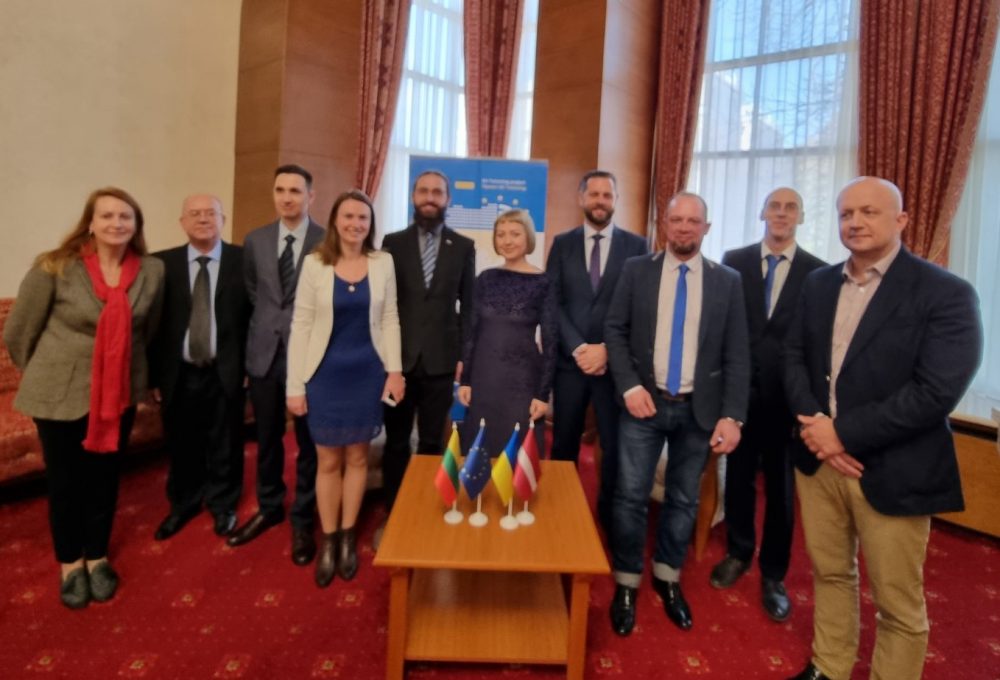
On Friday, 29 October 2021, the Closing Conference of the EU-funded Twinning Project “Strengthening the Regulatory Capacity of the National Communications Regulatory and Informatization Commission in the Areas of Market Access and Quality of Service Monitoring System” was held in Kyiv. At the Closing Conference speakers presented the results achieved by the project and discussed the sustainability and future perspectives of the Twinning Project outputs. During 26 months of the project Lithuanian, Latvian, German and Polish experts helped to strengthen Ukrainian electronic communications regulatory authority in the fields of market access and quality of service monitoring system in line with the EU standards.
“The EU and the European Commission attach a great importance to Ukraine’s efforts to advance the digital agenda. The Twinning project became an important initiative to contribute into strengthening of the national telecommunications regulator for successful promotion of digital agenda in the country,” Mr. Frederik Coene, Head of Cooperation of the EU Delegation to Ukraine, noted.
“Considering that the Project was being implemented during a critical period of time for us, such as substantial changes to the national sectoral legal framework, our partners from Lithuanian and Latvian Regulators over more than 2 years have contributed to significant developments in regard to quality of service and market analysis issues, which stand among essential pillars of the telecom sector regulation, and once again have proven 100 percent effectiveness of such technical support as the Twinning instrument”, Alexander Zhyvotovsky, Partner Country Project Leader, Chairman of the National Commission for the State Regulation of Communications and Informatization of Ukraine (NCCIR), said.
The project results are the following: 39 EU experts involved, more than 800 working days of implementation as well as several study visits (to Lithuania and Latvia) for 21 Ukrainian experts to exchange practical experience. The Twinning Project has developed 21 documents (guidelines, proposals for secondary legislation, recommendations) with practical regulatory advice which shall ensure smooth implementation of the best EU regulatory practices in the fields of Market analysis and Quality of Service (QoS) monitoring in electronic communications. To strengthen the sustainability of the results even further 12 events have been organised: 6 workshops with an active involvement of Ukrainian stakeholders and 8 trainings for NCCIR staff.
“We all agreed that the independence of the regulator is important not only for the communications sector, but also for the entire national economy, therefore, it is very important for such an institution to have a properly prepared legal framework and regulatory levers created on its basis. I am happy that the Twinning project team contributed to the main legal acts giving a solid basis for the national regulatory institution of Ukraine to focus on its efficient operation in line with EU legal framework”, Feliksas Dobrovolskis, Director of the Communications Regulatory Authority of the Republic of Lithuania, MS Project leader said.
Under the Component 1 (Quality of Service monitoring), led by Lithuanian experts, there have been 11 Guidelines and 4 proposals for the draft secondary legislation elaborated to strengthen capacities of NCCIR in the field of QoS monitoring, enforcement, and empowering consumers. In addition to that, with a target to ensure the sustainability of the results, number of events have been organised: 5 trainings for NCCIR staff and 4 workshops with the involvement of external stakeholders.
Under the Component 2 (Market access), led by Latvian experts, a significant proportion of the time has been devoted to the practical execution of a full cycle of market analysis of two most important markets (Wholesale unbundled access (including shared access) to metallic loop and subloops for the purpose of providing broadband and voice services (market 11) and Wholesale broadband (bit-stream) access (market 12)) according to the current EU best practice. Moreover, 3 proposals for the enhancement of the secondary legislation have been prepared as well as several recommendations towards further steps (transitory regulation of termination rates as well as recommended list of markets). To strengthen sustainability of the results, 3 workshops with an active engagement of stakeholders as well as practical training to NCCIR staff have been implemented.
All these activities were implemented with the objective to support Ukraine in the development of its telecom regulatory framework in line with the EU regulatory framework which consequently shall ensure the provision of a competitive environment for all market players in the Ukrainian electronic communications sector and ultimately wider choice of higher quality electronic communications services for consumers. To increase the take up and sustainability of results, the majority of deliverables of the project have been translated into Ukrainian, communicated and discussed with the relevant stakeholders during workshops, seminars, and trainings.
Background information:
The Twinning Project “Strengthening the Regulatory Capacity of the National Commission for the State Regulation of Communications and Informatization in the Areas of Market Access and Quality of Service Monitoring System” is financed by the EU ENI Programme. It has been implemented over a period of 26 months by the Communications Regulatory Authority of the Republic of Lithuania, Public Utilities Commission of the Republic of Latvia, and the Central Project Management Agency (Lithuania) in a partnership with the National Commission for the State Regulation of Communications and Informatization (Ukraine). Budget: EUR 1.3 million. Duration: September 2019 – November 2021.
Twinning is a European Union tool for institutional cooperation between the authorities of EU Member States and those of partner countries. Twinning projects are based on direct exchange of knowledge and expertise.
Updated on 2021-10-29